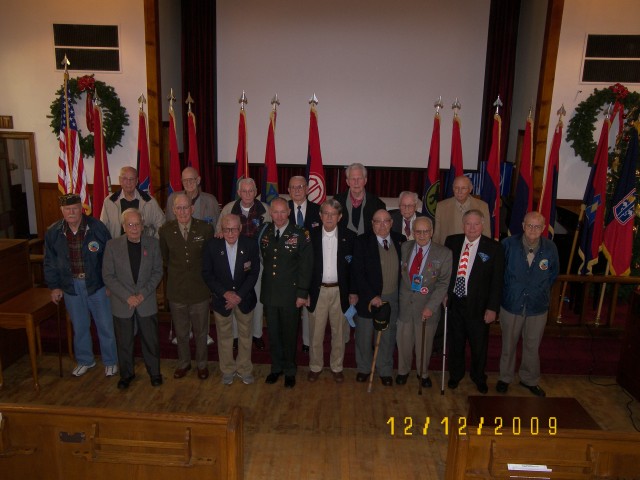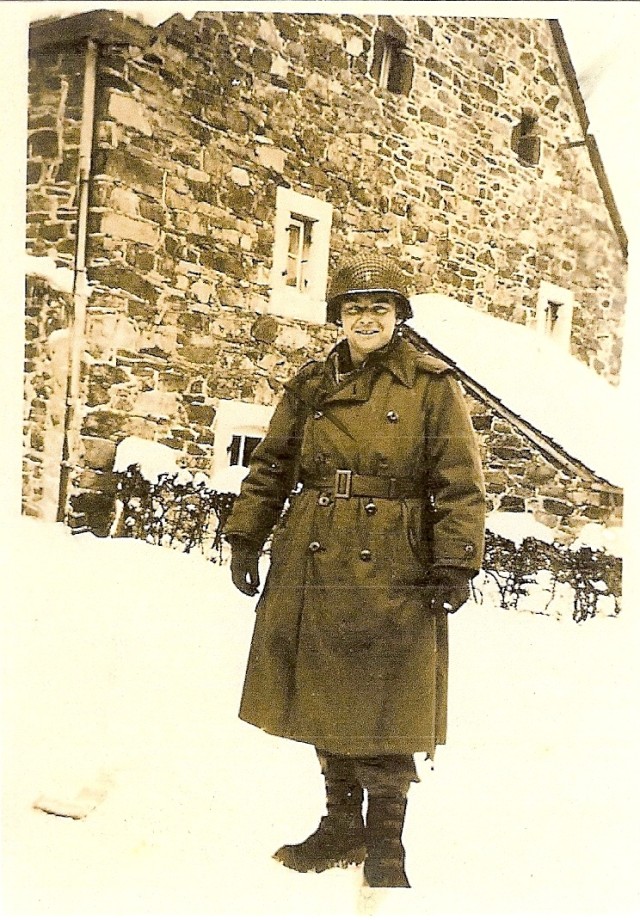FORT JACKSON, S.C. -- Nearly 70 years ago, more than 800,000 Soldiers fought in the Battle of the Bulge, one of World War II's largest and bloodiest battles for American forces.
Last week, 16 of those Soldiers were honored for their part in the battle in a day-long event sponsored by Fort Jackson's 171st Infantry Brigade.
"The event was to show how much Fort Jackson appreciates the legacy of what the veterans did during World War II," said Col. Karl Reed, the commander of the 171st.
"The heroism they demonstrated on the battlefields of Europe and the Pacific has hailed them as our greatest generation."
The South Carolina chapter of Veterans of the Battle of the Bulge toured the post Saturday as part of the 65th anniversary of the battle. Their tour included a memorial service, lunch with Basic Combat Training Soldiers and a chance to test out their marksmanship skills at the Engagement and Skills Training computerized marksmanship range.
The Battle of the Bulge, which lasted from Dec. 16, 1944 through late January, 1945, was the last German offensive on the Western Front. The battle was an unsuccessful attempt to divide Allied forces and prevent an invasion of Germany.
The strike was devastating and resulted in nearly 80,000 American losses, including those wounded in action and those considered missing in action.
Jim Mooneyhan, one of the veterans who attended Saturday's event, said he could remember the exact moment he received word that the Germans had broken through Allied defense lines.
"I found out about the breakthrough on Dec. 16," Mooneyhan said. "A Soldier brought word that we were to retreat back as far as necessary, and not to let the Germans capture our equipment."
Shortly after retreating to Liege, Belgium, Mooneyhan's company was tasked with getting supplies to Soldiers who had been cut off. It took the company of 220 Soldiers nearly an hour to travel 3 miles to provide needed rations to awaiting Soldiers.
"I remember taking rations to 'No Man's Land.' It was there that I lost two Soldiers - the only two Soldiers I lost during the Battle of the Bulge," Mooneyhan said. "They were separated from the unit, and got trapped in a ridge that was hit with heavy artillery. We went back three months later, found their bodies, and gave them a proper burial."
Vernon Brantley, who was a private first class in the 289th Regiment, was also part of last week's tour.
"My unit had just arrived in Germany from France when we received a message to load up and go back to Luxembourg," Brantley said. "We got word that the Germans had dropped a lot of paratroopers behind our lines, and that they were dressed like American Soldiers and spoke English. ... They were there to create confusion."
Brantley described the next 10 days as a very dark and scary time when Soldiers waited for reinforcements.
Part of Germany's tactic was to launch the attack during poor weather conditions to help neutralize Allied air superiority. "It was on Christmas Day that the conditions finally broke," Brantley said.
"It was on that bright, clear and cold Christmas morning in 1944 that the ground froze solid," he said. "The tanks and air forces could finally maneuver, and get assistance to all of us who were previously blocked off."
Brantley said the rising of the sun that Christmas brought him hope during a dire situation.
"It was a welcome sign to see the sun come up. It meant that we were alive for one more day."
After last week's visit, Leif Maseng, president of the chapter, said he was moved that the 171st had put forth so much effort to recognize a difficult time during the veterans' lives.
"I was so enthralled, and so moved by what was going on during the events," he said. "All of it was so great, but I think being welcomed at the door of the post chapel by young Soldiers and feeling a kinship with them moved me the most."




Social Sharing